Nov 5, 2025 – Departure from Bhutan, Transit Through Bangkok
Hello. Today, Sunim concluded his visit to Bhutan and departed from Paro Airport to Bangkok on his way back to Korea.
After completing his morning practice and meditation, Sunim briefly discussed work matters with the Bhutan JTS volunteers at 5 AM before departing for the airport. First, Sunim talked about several points to keep in mind when working with local residents.
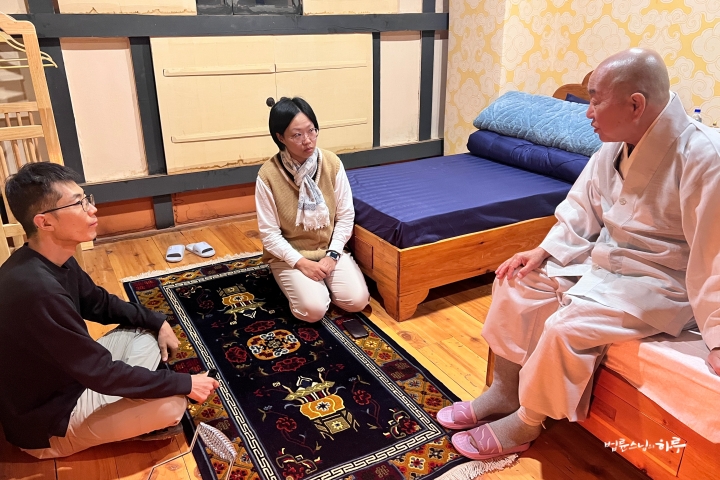
“Don’t push the projects too hard. From the residents’ perspective, even making ends meet is challenging. In such situations, additional labor like building someone else’s house or paving roads is never easy. While we certainly need to be frugal, what I consider important is fostering the residents’ self-reliance. If there are some results and residents are participating with joy, then it’s good to be flexible with principles and not spare support. Of course, in the beginning, it’s necessary to strictly follow the principles.
What’s More Important Than the Project Is the Residents’ Self-Reliance
For example, in Nabji village, residents’ skills improved significantly through communal work. This process became an opportunity for residents to learn and grow. The preschool building in Dungeshwari village in India may look humble on the outside, but it was built by labor school students as practice. Through such hands-on experience, they were able to grow into skilled workers. There’s a big difference in experience between just practicing alone and actually building a structure. Even if there are some shortcomings, rather than just pointing them out, it’s important to wait and allow them to learn on their own.”
The volunteers also shared the difficulties they face in the field.
“When doing temple renovation work, the residents are enthusiastic, but sometimes they expand the construction on their own without consulting JTS, which puts us in a difficult position.”
Sunim smiled and said:
“It takes a long time for rural residents to understand the concept of principles. From now on, you need to plan projects with the possibility in mind that residents might act on their own. Don’t make an issue of what’s already done, but always think about what to do going forward. Because residents have lived their lives without set frameworks, the very concept of ‘principles to follow’ is unfamiliar to them. It means they’re not deliberately breaking rules. Their concept of dates is also vague, so even if you promise to ‘finish by a certain date,’ it’s often difficult to keep. While considering this sentiment and pushing forward with projects, in the next phase, you should gradually improve by asking, ‘We couldn’t keep our promise last time, so what shall we do this time?'”
After finishing the work discussion, the Bhutan JTS volunteers offered three bows to Sunim who was departing.
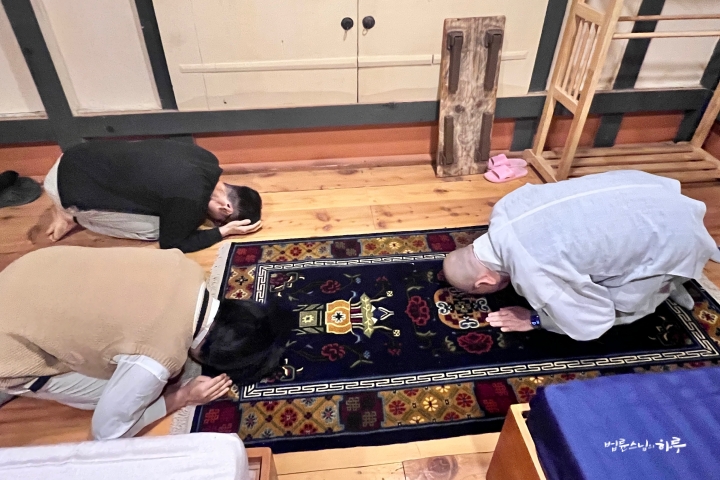
The Bhutanese government provided a vehicle for Sunim’s transportation to the airport. Yeshi, the Bhutanese government’s JTS project coordinator, came to the accommodation early in the morning to see Sunim off despite it being his day off. The JTS volunteers also accompanied Sunim to the airport.
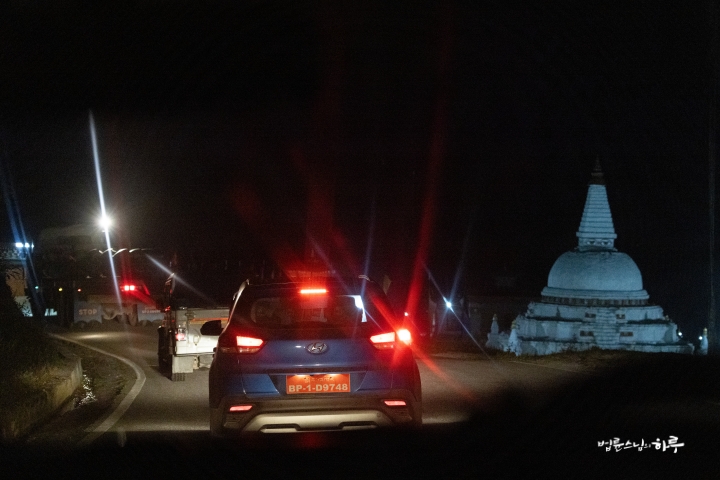
Upon arriving at Paro Airport, Sunim exchanged farewell greetings with the JTS volunteers.
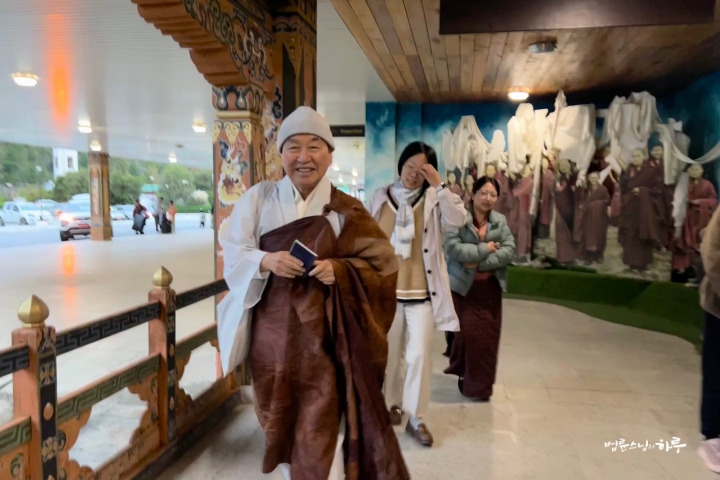
“Have a safe trip, Sunim.”
“Thank you for your hard work.”
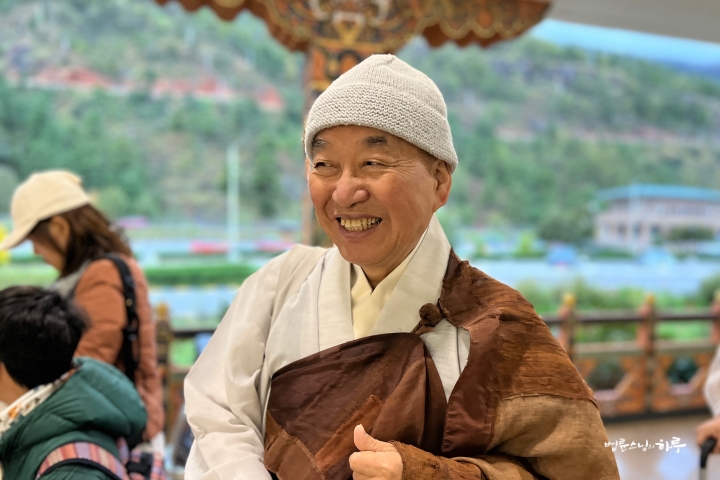
The flight to Bangkok was delayed, so Sunim waited an additional hour and a half before boarding the plane.

The plane departed from Paro Airport at 9:30 AM and after a 3-hour and 10-minute flight, landed at Bangkok Airport at 1:40 PM local time.
When Sunim came out of the airport, he was warmly greeted by Hwang So-yeon, a Jungto Society member. Sunim toured a site with Hwang So-yeon for the establishment of a JTS training center. Last September, he had looked at several candidate sites for the JTS training center that could be reached within an hour from Bangkok’s two airports. Today, he surveyed and examined one more location.
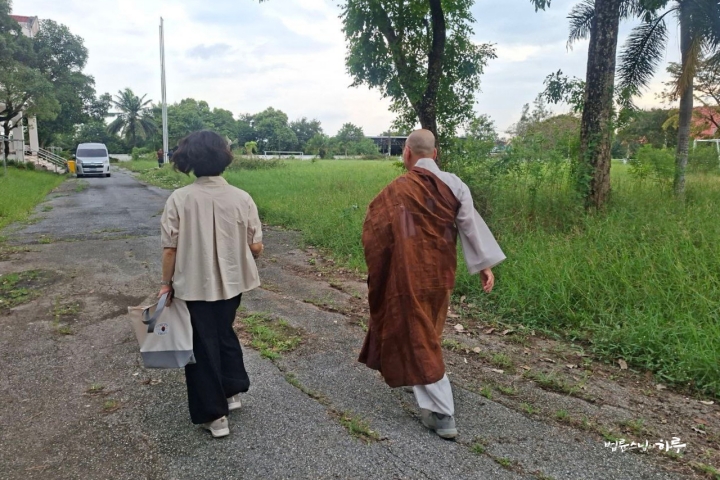
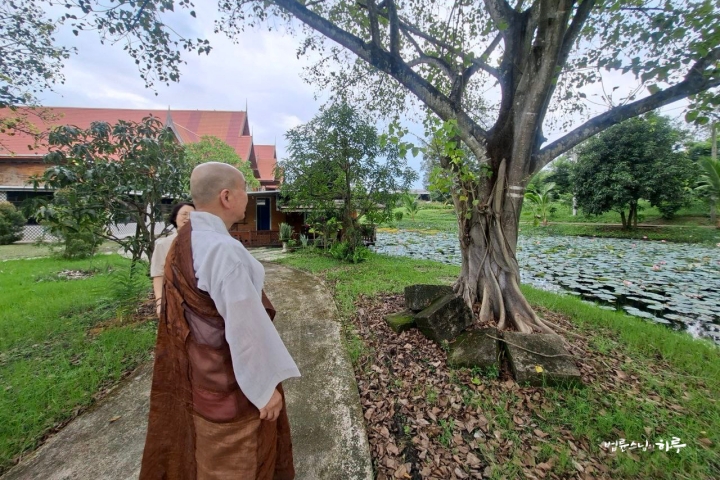

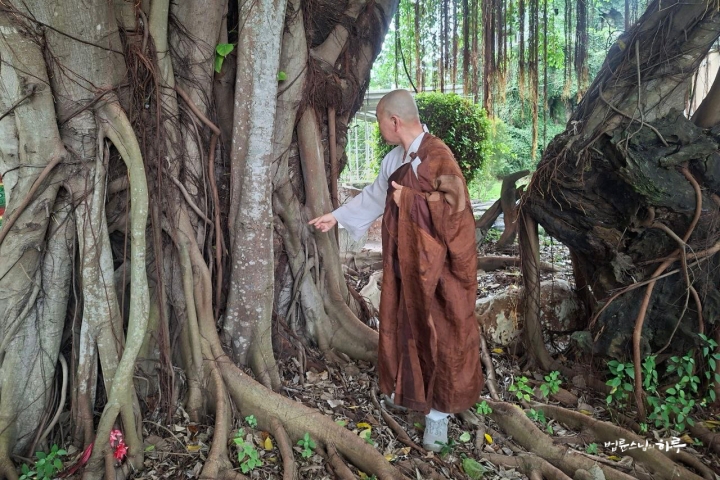
After completing the survey, Sunim headed back to Bangkok Airport to travel to Korea. After completing departure procedures, he worked on manuscript proofreading and business matters at the boarding gate before departing Bangkok Airport at 10:20 PM.
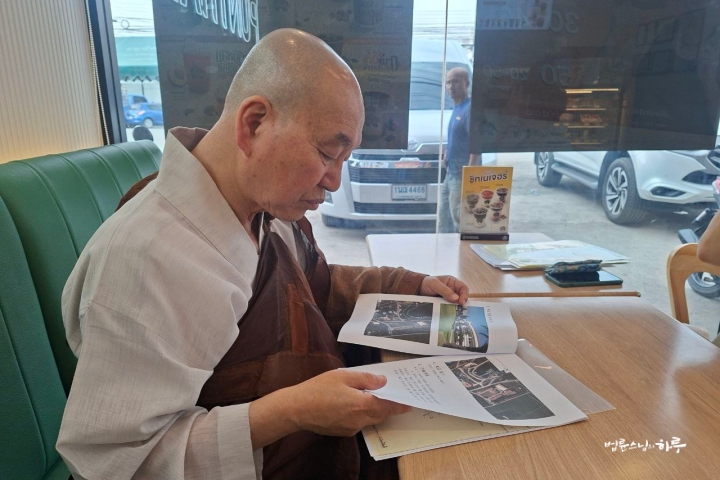
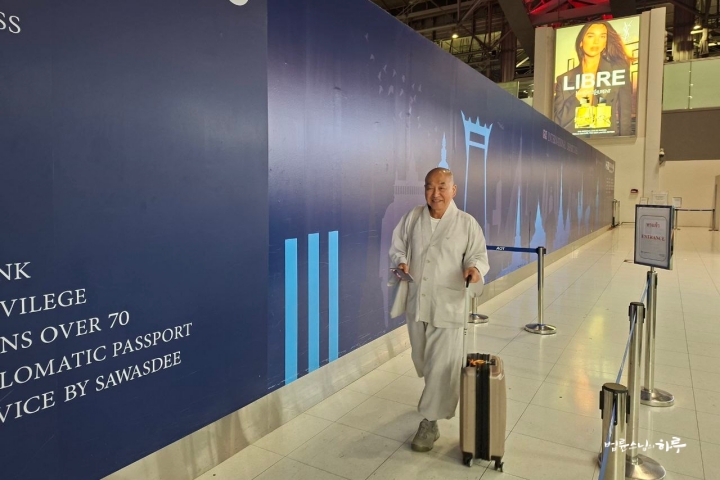
As soon as the plane took off, Sunim fell asleep. He dozed in his airplane seat throughout the night.

Tomorrow, after a 5-hour and 45-minute flight, Sunim will arrive at Incheon Airport at 6 AM. In the morning, he will meet with JTS volunteers at the Seoul Jungto Social and Cultural Center to discuss emergency relief plans for Jamaica, which suffered severe hurricane damage. In the afternoon, he plans to move to Dubuk Jungto Retreat Center.
Since there was no Dharma talk today, we will conclude by sharing a dialogue between a questioner and Sunim from the Happy Dialogue Dharma Q&A held in Daegu on the 24th of last month.
My Brothers Took My Father’s Retirement Funds. How Can I Restore Our Relationship?
“If you don’t interfere in your brothers’ affairs, your relationship will improve.”
“I didn’t want to interfere, but my father asked me first. Since he borrowed money and didn’t repay it, my father couldn’t sleep because of his anger-induced illness and complained to me. He said, ‘Your second brother said he’d pay more than bank interest but isn’t paying back.’ Since he was struggling, I had no choice but to step in.”
“In such cases, you should just say, ‘Oh, I see,’ and leave it at that. Why step in?”
“You’re right. Thanks to me drawing the sword, we fortunately got some of the money back. But my brother, who used to preside over ancestral rites, didn’t even attend this time, didn’t enter the room during Chuseok, and just left the ritual vessels and table with the folding screen.”
“There’s no need to worry about it for long. If you want to interfere, you need to be prepared to be criticized. If you don’t want to be criticized, don’t interfere.”
“That’s right. Since I’ve already interfered, I want to mend the relationship going forward.”
“Then accept the criticism. If you interfered, you should accept criticism. What does it matter if the relationship is bad? If a marital relationship is bad, it greatly affects the children, but if sibling relationships are bad, you just don’t meet. You’re worrying about something that’s not a big deal.”
“I feel so heartbroken because I think my brothers’ behavior is causing my father pain.”
“If your heart aches that much, just pay your father back with your own money. In the end, it’s difficult because you’re trying to solve the problem without contributing any of your own money.”
“That’s not true. Unlike my brothers, I gave my father pocket money for several years after getting married.”
“That’s not what I’m talking about. What I mean is whether your eldest brother takes pocket money from your father or not is none of your business. It’s a matter between father and child, but you presumptuously interfered. You keep saying, ‘Even if you can’t give pocket money, don’t take it!’ but who took it? Your brother didn’t take it; he received it from your father. If you didn’t take money from your father, that’s good. But thinking ‘I didn’t take any, so why are you taking some?’ is wrong. Whether your father gives his money to his children or to some woman, that’s your father’s freedom.
First, you interfered in something that wasn’t your business. Second, when your father asks, ‘Your second brother took money from me and isn’t paying it back, so you talk to him,’ you should first ask, ‘Father, is it okay if our sibling bond breaks?’ If he asks what you mean, you should say this:
‘If I interfere, my brother will be upset. Then our sibling bond will break. If you think it’s okay for the bond to break, I’ll interfere. If you think the bond shouldn’t break, please talk to him directly yourself.’
It’s already predictable, isn’t it? And let’s say I’m doing business and need some money. If father has money, anyone would naturally try to borrow it. In the old days, if a king had five princes under him, they were siblings but also competitors for succession to the throne. That’s why killings among siblings occurred. Thinking ‘How could one kill a sibling?’ is wrong. Such things have happened countless times throughout history. In India, there are many records of someone becoming king after killing 99 siblings. The same goes for King Ashoka. He’s called India’s greatest sage king, but he actually became king after killing 100 siblings. Conflicts arise among siblings because father has money; bank money doesn’t cause conflicts among siblings. Parents’ money inevitably becomes an object of competition among siblings. Your eldest brother is siphoning off father’s money bit by bit, your second brother took a large sum, and you feel bad because you can’t do that. But if you try to take father’s money too, you feel guilty. That’s all there is to it.”
“I don’t think it’s the latter.”
“Then you shouldn’t interfere. You’re talking as if you’re so great, but there’s nothing great about it. At least your brother takes money, but you can’t even do that. You can’t take money, your sibling relationships are broken, your heart is troubled – that makes you the biggest fool among fools. Why are you talking about it as if it’s something to be proud of? You’re not great; you’re foolish.
First, if you care about sibling harmony, you shouldn’t interfere. Even if your father asks, you need to say, ‘Please talk about such matters directly yourself,’ and not interfere. Second, if you’re going to interfere because your father asked, you need to know that this issue will inevitably cause a rift among siblings and approach it with the resolve that ‘I’ll solve it even if it causes a rift.’ If you got the money back, that’s fortunate, and you shouldn’t mind that sibling harmony was somewhat broken.
For example, if I help starving North Korean compatriots, some people praise me for helping unfortunate people, while others criticize me saying, ‘The food we send becomes bullets that come back to us.’ The international community generally supports it. Since we’re helping people in difficulty living in a hostile country, they say I’m a humanist with tremendous compassion. But in our society, there are many people who hate North Korea. Those people curse, saying, ‘If you like North Korea so much, just go live there!’ You might feel wronged thinking why they curse you for helping hungry people, but such work is already destined to receive criticism. If you don’t want to be criticized, don’t do support activities. If you did support work, you need to accept being criticized.
Right now, I’m being criticized mainly for two things. One is providing humanitarian aid to North Korea, and the other is saying, ‘If you have a child, it’s better for the mother to raise them until age three.’ I’ve been heavily criticized by working mothers for saying this. They criticize me saying, ‘You try giving birth and raising a child!’ but I’ve never made excuses for that criticism. I think the criticism is justified. But I’m speaking from the child’s perspective. Would any child want to drink cow’s milk rather than their mother’s breast milk? Would any child want to be held by their grandmother rather than their own mother? But since many women don’t do this, I’m speaking on behalf of the children. I’m not saying to raise them for life, just that mothers should raise them at least until age three for the child’s benefit. Because that period is an important time when the child’s ego is forming. If a child develops emotional deprivation during that time, they’ll live their whole life suffering from ‘love starvation disease,’ constantly craving. So until age three, you need to satisfy them enough to prevent this craving so the child can grow up happy.

Of course, it’s difficult to work while raising children. I fully understand the desire to have someone help with childcare. In such situations, when I keep saying ‘mothers should raise their children,’ it naturally upsets people. Saying such things is bound to invite criticism from the start. I continue to say these things quietly because I believe they must be said, even if it means being criticized. Everyone over forty whose children have passed through adolescence unanimously says, ‘How wonderful it would have been if I had heard this from Sunim earlier!’ That’s why Venerable Pomnyun Sunim’s fans are mainly in their 40s and 50s. They realize, ‘Looking back, Sunim was right about everything.’ However, young women tend to disagree with what I say. They’re more likely to think I don’t understand their struggles. So criticism is already expected.
So it’s the same for you. If you get involved, just accept the criticism. Don’t waste time saying things like your feelings are hurt. If sibling harmony is truly important, then no matter what your father says, just respond with ‘Yes, Father’ and move on.”
“Thank you so much for your wise words, Sunim. I hope to hear your wonderful Dharma talks for a long time to come. Thank you.”





